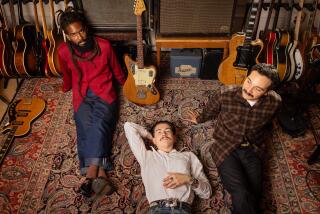Belle and Sebastian’s ‘Girls in Peacetime Want to Dance’ finds its soul
- Share via
The world is a disaster, we’re all getting older, and a higher power may not be there to save us. So let’s get a groove on.
Welcome to the universe of Belle and Sebastian’s ninth studio album, “Girls in Peacetime Want to Dance,” out Jan. 20, which sees the orchestral pop band reawakening its inner disco soul and taking its character sketches out for a worldly spin.
“Back in the day,” says singer-songwriter Stuart Murdoch, “I lived in a much smaller world. Those first couple [of] records were almost just exploring my city. Geographically, they existed in a city.”
That city would be Glasgow. Formed there about two decades ago, Belle and Sebastian’s trademark pastoral sound and acidic lyricism is greeted with a rhythmic kick and a Euro-pop sheen on “Girls in Peacetime Want to Dance.” If the album has a bop to it, this is a party as the city is burning — much of the album sees Murdoch and his five band mates grappling with a worldview that has been shaken by current events.
“If we live by books and we live by hope, does that make us targets for gunfire?” he sings as delicately as ever on opening track “Nobody’s Empire.”
“I’m not saying they’re better than the songs I used to write, but at least these characters acknowledge the world,” Murdoch says. “These new songs acknowledge that there are subtle forces that act upon people all over the place — 24-hour media, etc.”
Belle and Sebastian began bringing a little disco oomph to its albums on 2006’s “The Life Pursuit,” and the rhythms are front and center on new tracks such as “The Party Line” and “Enter Sylvia Plath.” The latter, says Murdoch, is a “big electro-pop song about a person being liberated by American literature,” while the former utilizes the sort of crystallized funk guitars that were left in the ‘70s until Daft Punk resurrected them.
If Murdoch, speaking from his Glasgow home moments after putting his 1 1/2-year-old son to bed, downplays some of the album’s musical adventurousness (see the klezmer breakdown on “The Everlasting Muse”), lyrically no one can deny that the band is in one of the most cynical places of its career. “Perfect Couples” wonders if a lack of commitment is the new norm, “The Party Line” is exhausted by endless politicization and “Allie,” the album’s most aggressively jangly song, sees the lead character wrestling for an identity.
“I was looking at a snapshot of a character who has been politicized by the world around her, but not in a good way — not in a healthy way,” Murdoch says. “She’s isolated, like so many people are. She’s isolated behind her computer. I was thinking about young people, and it seems to me a little bit unhealthy to see the world through the perspective of the Internet.”
Belle and Sebastian tinkered with multiple sonic experiments before recording the album. Early in the process, Murdoch theorized that each song should represent different countries’ entries into the Eurovision Song Contest, circa the mid-’70s. The slightly ABBA-esque Scandinavian lilt of “Play for Today” hints at that concept, but the idea was eventually abandoned.
Murdoch then suggested interviewing 10 fans and crafting songs inspired by the conversations, starting with two of the actors who appeared in his 2014 musical film, “God Help the Girl.” This idea quickly fizzled as the band wasn’t on tour and wouldn’t get the requisite diversity of points of view needed.
By the time the band linked with producer Ben Allen, whose expansive mixing and production credits include hip-hop-leaning dance star M.I.A. and experimental indie acts such as Animal Collective, Murdoch knew the tone “Girls in Peacetime Want to Dance” would take.
Religion has figured heavily throughout Belle and Sebastian’s work, and the new album is no different. See the string-enhanced luxuriousness of “The Cat With the Cream,” in which the main character sits alone and prays in the dark for some sort of answer that isn’t coming from local politicians or her mother, who seems more preoccupied with a new boyfriend.
It’s the cornerstone of the record, Murdoch says, and the song that telegraphs that “Girls in Peacetime Want to Dance” is really a soul album.
“Hopefully it’s not something that’s ponderous,” he says. “You don’t want to bring that baggage into a pop record. But at the same time, I think it adds heft. People forget that the origin of a lot of soul and gospel music is the church, and it’s not just because people were in the church singing songs. There’s a spiritual element that goes hand in hand with great music.”
Often when the word “political” is mentioned during the 50-minute interview, Murdoch will subtly shift the conversation by utilizing the word “spiritual” instead. Musically, spirituality is evident in some songs more than others — the hymn-like “Today (This Army’s for Peace”) or the guitar-meets-gospel stomp of “The Book of You.”
“Personally, I think this record is far more a spiritual record than it is a political record,” Murdoch says. “There’s a spirituality at the root of every song I wrote. It’s harder to talk about. It’s harder to write about. It’s not on the surface, but I’ll tell you right now, I do think this record is a soul record. I don’t care if anyone laughs at me for saying that.
“Soul means different things to different people musically, but souls are on the line here in these songs.”
Twitter: @Toddmartens
More to Read
The biggest entertainment stories
Get our big stories about Hollywood, film, television, music, arts, culture and more right in your inbox as soon as they publish.
You may occasionally receive promotional content from the Los Angeles Times.











